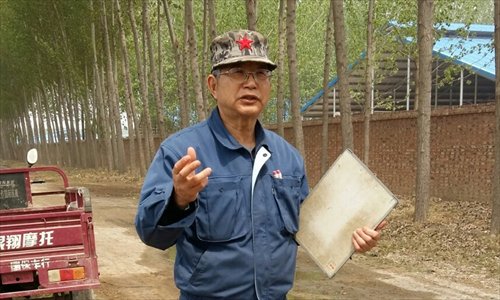
(Photo: globaltimes.cn)
ZHENGZHOU, Dec. 26 (Xinhua) -- For Kawasaki Hiroto, a 72-year-old Japanese agricultural expert, promoting organic farming in China has become a lifelong pursuit.
"Prepare a grave for me here in China, this is where I'll work till my last breath," said Kawasaki to his Chinese partner after one of his trips back to China.
Kawasaki has been in China for nearly a decade, and his calling is to promote manure composting and recycled farming, both greener farming methods, in the country.
So far, the Japanese green farming enthusiast's mission has won him more than 270,000 followers on Chinese micro-blogging site Weibo. Four years ago, the number was less than 300.
Kawasaki teamed up with Xiaoliugu Farm in the city of Xinxiang, central China's Henan Province, to apply green farming methods and train young farmers across the country in the skills needed to popularize the green techniques.
"The task for the rest of my life is to cultivate talent and hope that recycled agriculture can be widely applied in the future," Kawasaki wrote in 2017.
Back in 2009, Kawasaki worked at a Chinese university and was appalled to find that many Chinese villagers threw livestock manure into the field or rivers without any disposal methods, and the abusive use of fertilizers was causing the soil to harden, affecting product yield and quality.
Later, the retiree from a Japanese agricultural cooperative decided to alter the situation by promoting manure composting and recycled farming.
"When I told my wife that I was going to work in China, she thought I no longer loved her," Kawasaki said with a laugh. Under his insistence, his wife finally understood and agreed.
In 2013, Kawasaki traveled to farms across China looking for partners to achieve his vision but was turned down many times because of the high cost of implementing the methods.
Kawasaki began learning Chinese in 2009 and did not have a good grasp on the language at that time. In addition, he had a hard time getting used to pit toilets, which are common in Chinese countrysides.
Then, through a friend's introduction, he met Li Wei, a former journalist who inherited a hog farm from her father. She wanted to transform the hog farm into an organic farm but found it difficult without proper techniques.
"We both wanted to use recycled farming back then," said Li. "Kawasaki also broadened my mind by introducing deep processing in our wheat production."
Kawasaki's methods helped boost wheat yield and sales for the farm, and Li invited him to stay.
In the winter of 2015, a snowstorm destroyed 35 greenhouses on the farm and Kawasaki's posts on Weibo helped them sell nearly 70,000 yuan (about 10,179 U.S. dollars) of products in just a few days.
Kawasaki's publicity has also brought in online sales for Li's farm. In 2017, he launched training classes to promote the green techniques.
"Next year, I plan to go to study at a Japanese agricultural company," said Liu Yan, a fresh graduate from a local university participating in the training sessions.
More than 100 people have participated in the program and some have even come from other parts of China thousands of miles away.


